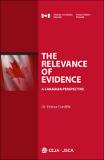|
Reseña:
|
This paper supplies a description of the sources of evidence law in Canada, and the history of reform to that law before turning to a discussion of the role and responsibilities of the trial judge and parties. Against this structural background, the paper introduces the key legal concepts of relevance, probative value and prejudicial effect; and explores how these concepts provide the basic organizing principles for the proper analysis of the admissibility of information into a Canadian trial. The paper turns to the examples of expert evidence and sexual history evidence to illustrate how the structural and conceptual
features of Canadian evidence law work together to advance the goal of reaching accurate verdicts while respecting human rights. |

